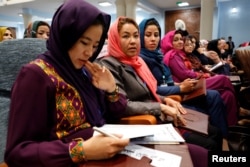The United States and the Taliban have begun a new round of negotiations in Doha, Qatar, in a bid to advance peace efforts in Afghanistan and to urge the insurgent group to participate in an inclusive intra-Afghan dialogue.
U.S. special reconciliation envoy, Zalmay Khalilzad, led the U.S. team Wednesday in talks with insurgent leaders based in the Qatari capital, officials said.
A Taliban official told VOA the discussions would focus on fleshing out “some remaining details” of a preliminary agreement the two sides had reached in their last meeting in early March. The official, who spoke on condition of anonymity, anticipated further progress in the talks, but would not speculate how long this meeting might last.
The insurgent group has underscored the need for finalizing an agreement on the withdrawal of U.S.-led foreign troops before it discusses other issues.
Prior to Wednesday's formal negotiations, Khalilzad met with Mullah Abdul Ghani Baradar, the deputy Taliban leader for political affairs and head of the group’s informal office in Doha.
“It is absolutely vital that the two key agenda points of the previous meeting (full withdrawal of foreign forces from Afghanistan and preventing Afghanistan from harming others) be finalized,” a Taliban statement quoted Baradar as telling the U.S. chief negotiator. "This will open the way for resolving other aspects of the issue and we cannot enter into other topics before this,” he stressed.
If finalized, the U.S.-Taliban agreement would bind the insurgent group to prevent transnational terrorist networks from using Afghan soil to harm other countries, and Washington in return would agree to a timetable for withdrawal of all foreign troops from Afghanistan.
Khalilzad, however, has repeatedly stated a comprehensive Taliban cease-fire and the rebel group's participation in intra-Afghan peace discussions would be key to concluding the deal.
The Afghan government has been excluded from the dialogue because the insurgent group has maintained from the outset it will not participate in any formal internal Afghan peace discussions until Washington agrees and announces a foreign troop withdrawal timeline.
Wednesday’s talks came as a four-day "Consultative Peace Loya Jirga" is underway in Kabul to debate the framework for negotiations with the Taliban. The assembly, which began Monday, was convened by President Ashraf Ghani, but most of the candidates contesting upcoming presidential elections have boycotted the meeting. They called it electioneering by Ghani, who is also seeking election in the September 28 polls.
Afghan presidential envoy, Umer Daudzai, Wednesday dismissed the criticism, saying the peace process is the focus of what he described as “the biggest” and “the most inclusive” Loya Jirga of the history of Afghanistan.
Daudzai explained U.S.-led peace efforts had generated a debate inside the country and those widespread debates needed to be provided with a national “direction and platform” to help the peace process.
“There was no other mechanism than Loya Jirga to bring all those debates together to turn it into one grand debate that will transform into a list of recommendations to the Afghan state and to international community, and perhaps to the Taliban,” the presidential envoy noted.
Daudzai asserted that representatives from Taliban-control districts have also come to attend the ongoing traditional assembly in the Afghan capital, thanking the insurgents “if they have not intentionally hindered” the delegates from traveling Kabul.
The Taliban has already rejected the assembly as a ploy to help Ghani extend his rule and damage the group’s ongoing peace talks with America.
Prior to his arrival in Qatar, ambassador Khalilzad held talks with leaders in Pakistan and sought their help to convince the Taliban to participate in intra-Afghan talks.
The Afghan-born American diplomat tweeted on Tuesday that “Pakistan supports efforts to accelerate intra-afghan dialogue and negotiations, and is committed to helping reduce violence in Afghanistan.”
“I'm also encouraged by the role Pakistan wants to play in building regional consensus in support of the Afghan peace process. The time to implement has come,” said Khalilzad.
Islamabad is accused of covertly supporting and sheltering insurgent leaders, takes credit for arranging the ongoing U.S.-Taliban dialogue. Pakistan’s own security and stability requires a peaceful Afghanistan, say Pakistani officials while underscoring their role in the Afghan peace process.
“We strongly hope that our sincere efforts for ending decades of insecurity and establishing peace in Afghanistan will succeed,” Foreign Minister Shah Mehmood Qureshi said Wednesday while talking to a visiting delegation of Afghan experts.











